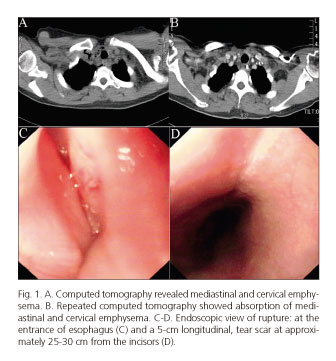Mi SciELO
Servicios Personalizados
Revista
Articulo
Indicadores
-
 Citado por SciELO
Citado por SciELO -
 Accesos
Accesos
Links relacionados
-
 Citado por Google
Citado por Google -
 Similares en
SciELO
Similares en
SciELO -
 Similares en Google
Similares en Google
Compartir
Revista Española de Enfermedades Digestivas
versión impresa ISSN 1130-0108
Rev. esp. enferm. dig. vol.108 no.11 Madrid nov. 2016
https://dx.doi.org/10.17235/reed.2016.4307/2016
LETTERS TO THE EDITOR
Rupture of esophagus by compressed air
Key words: Spontaneous oesophageal rupture. Oesophageal injury. Compressed air.
Dear Editor,
Currently, beverages containing compressed air such as cola and champagne are widely used in our daily life. Improper ways to unscrew the bottle, usually by using the teeth, could lead to an injury, even a rupture of the esophagus.
Case report
A 52-year-old woman came to our hospital with neck and chest pain for two days. She got this pain due to an air blast from a bottle of traditional Chinese wine containing enormous compressed air when she was unscrewing it using her teeth. She also suffered from minor bleeding from the mouth and nose, but the bleeding stopped spontaneously. There was no fever, hematemesis, or other gastrointestinal symptoms. Physical examination was not remarkable. Laboratory tests showed increased level of inflammatory markers. Computed tomography (Fig. 1A) revealed mediastinal and cervical emphysema. Bronchoscopy was normal. She was kept fasting, and intravenous proton pump inhibitors and antibiotics were used.
Esophagogastroduodenoscopy performed 12 days later revealed a rupture at the entrance of the esophagus and a 5-cm longitudinal, tear scar at approximately 25-30 cm from the incisors (Fig. 1 C and D). A nasojejunal feeding tube was placed to support her nutrition. Her pain relieved and repeated computed tomography (Fig. 1B) showed absorption of mediastinal and cervical emphysema. The rupture healed after a conservative management of 42 days, and the nasojejunal tube was removed.
Discussion
Spontaneous rupture of the esophagus is rare, and it can be caused by excessive vomiting, children birth, seizures, etc. (1). Among the different causes, compressed air is a rare one (2-4).
Surgery intervention is usually recommended for diagnosed rupture (5). In the present case, an air blast injury was observed and two segments of the esophagus were involved. The rupture healed with conservative treatment without resorting to surgery.
Jie Wu, Yuyong Tan and Jirong Huo
Department of Gastroenterology.
The Second Xiangya Hospital of Central South University.
Changsha, Hunan. China
References
1. Pilling J, Goldstraw P. Spontaneous esophageal rupture. Br J Hosp Med (Lond) 2007;68:M202-5. DOI: 10.12968/hmed.2007.68.Sup12.27845. [ Links ]
2. Curci MR, Dibbins AW, Grimes CK. Compressed air injury to the esophagus: Case report. J Trauma 1989;29:1713-5. DOI: 10.1097/00005373-198912000-00023. [ Links ]
3. Holaday WJ. Rupture of esophagus by compressed air. N Engl J Med 1959;261:1071-3. DOI: 10.1056/NEJM195911192612108. [ Links ]
4. Webster PD 3rd, Taylor JR. Traumatic rupture of the esophagus by compressed air; report of case with review of 110 cases of esophageal rupture. N C Med J 1957;18:305-11. [ Links ]
5. De Schipper JP, Pull ter Gunne AF, Oostvogel HJ, et al. Spontaneous rupture of the esophagus: Boerhaave's syndrome in 2008. Dig Surg 2009;26:1-6. DOI: 10.1159/000191283. [ Links ]














